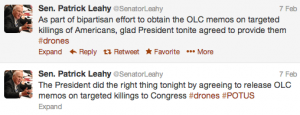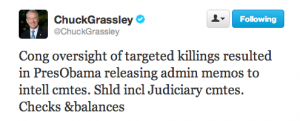CIA Director Petraeus’ Traditional Military Operations
One of Brennan’s answers to Additional Prehearing questions I didn’t gloss the other day is this one:
Question 8: What are your views on what some have described as the increased “militarization” of the CIA mission following September 11, 2001 attacks?
In my view, the CIA is the Nation’s premier “intelligence” agency, and needs to remain so. While CIA needs to maintain a paramilitary capability to be able to carry out covert action as directed by the President, the CIA should not be used, in my view, to carry out traditional military activities.
[snip]
Do you envision the CIA becoming more or less “militarized” in its mission, should you be confirmed?
The evolution of foreign threats will determine how the CIA adjusts its intelligence activities in the future. If I were to become the Director, I would plan to carry out CIA’s crucial missions, including collecting foreign intelligence, providing all-source analysis, conducting robust counterintelligence, and carrying out covert actions as directed by the President. If confirmed, I would not be the Director of a CIA that carries out missions that should be carried out by the U.S. military.
Brennan brought up the issue again in response to a question (which was prefaced by a totally inappropriate bid to his Jesuit training) from Barbara Mikulski.
At the beginning of her questioning, Sen. Barbara Mikulski (D-Md.) noted dryly that she had been “jerked around” by every CIA director she’d known as a legislator, with the exception of Leon Panetta. Brennan assured her “truthfulness is a value that was inculcated in me in my home in New Jersey.” But when Mikulski brought up about the CIA’s increasing role in paramilitary operations, describing that as “mission creep” and asking whether Brennan would steer the Agency back towards its more traditional intelligence-gathering role, Brennan said only that he would “take a look at the allocation of that mission,” before saying that the CIA “should not be involved in traditional military activities.” But Mikulski was talking about paramilitary activities such as drone strikes. No one actually accused the CIA of engaging in “traditional military activities.”
Clearly, Brennan is making a distinction between paramilitary actions he insists (contrary to the many claims he’d get out of the business) are a central part of CIA’s mandate and traditional military operations.
To some degree, he seems to be saying he will not abide by putting himself in the chain-of-command to give a JSOC op a legally pretty face.
But I couldn’t help thinking about Brennan’s answers as I read this WaPo article. While the article never comes out and says it, what it describes is Obama’s decision — taken at precisely the moment when Petraeus ousted, ostensibly for a consensual affair — to abandon an approach put in place by the retired general.
President Obama is unlikely to shift his stance against the expansion of a U.S. role in Syria’s civil war, despite a death toll topping 60,000 and acknowledgment that key members of his national security staff favored a plan first proposed in June to arm the Syrian rebels.


